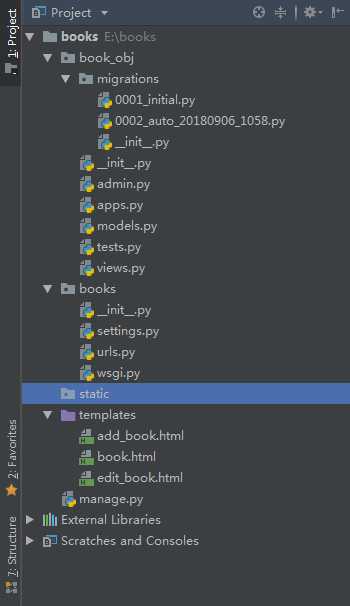Django之单表的增删改查
Posted zxmbky
tags:
篇首语:本文由小常识网(cha138.com)小编为大家整理,主要介绍了Django之单表的增删改查相关的知识,希望对你有一定的参考价值。

books/urls.py
"""books URL Configuration
The `urlpatterns` list routes URLs to views. For more information please see:
https://docs.djangoproject.com/en/1.11/topics/http/urls/
Examples:
Function views
1. Add an import: from my_app import views
2. Add a URL to urlpatterns: url(r‘^$‘, views.home, name=‘home‘)
Class-based views
1. Add an import: from other_app.views import Home
2. Add a URL to urlpatterns: url(r‘^$‘, Home.as_view(), name=‘home‘)
Including another URLconf
1. Import the include() function: from django.conf.urls import url, include
2. Add a URL to urlpatterns: url(r‘^blog/‘, include(‘blog.urls‘))
"""
from django.conf.urls import url
from django.contrib import admin
from book_obj import views
urlpatterns = [
url(r‘^admin/‘, admin.site.urls),
url(r‘^books/‘, views.book),
url(r‘^add_books/‘, views.add_book),
url(r‘^del_books/‘, views.del_book),
url(r‘^edit_books/‘, views.edit_book),
]
books/settings.py
""" Django settings for books project. Generated by ‘django-admin startproject‘ using Django 1.11.15. For more information on this file, see https://docs.djangoproject.com/en/1.11/topics/settings/ For the full list of settings and their values, see https://docs.djangoproject.com/en/1.11/ref/settings/ """ import os # Build paths inside the project like this: os.path.join(BASE_DIR, ...) BASE_DIR = os.path.dirname(os.path.dirname(os.path.abspath(__file__))) # Quick-start development settings - unsuitable for production # See https://docs.djangoproject.com/en/1.11/howto/deployment/checklist/ # SECURITY WARNING: keep the secret key used in production secret! SECRET_KEY = ‘@9_h!7w793k^6uw95^ooybm1+xx4&)u35n%cnfl+%[email protected]_^+^8‘ # SECURITY WARNING: don‘t run with debug turned on in production! DEBUG = True ALLOWED_HOSTS = [] # Application definition INSTALLED_APPS = [ ‘django.contrib.admin‘, ‘django.contrib.auth‘, ‘django.contrib.contenttypes‘, ‘django.contrib.sessions‘, ‘django.contrib.messages‘, ‘django.contrib.staticfiles‘, ‘book_obj.apps.BookObjConfig‘, ] MIDDLEWARE = [ ‘django.middleware.security.SecurityMiddleware‘, ‘django.contrib.sessions.middleware.SessionMiddleware‘, ‘django.middleware.common.CommonMiddleware‘, # ‘django.middleware.csrf.CsrfViewMiddleware‘, ‘django.contrib.auth.middleware.AuthenticationMiddleware‘, ‘django.contrib.messages.middleware.MessageMiddleware‘, ‘django.middleware.clickjacking.XFrameOptionsMiddleware‘, ] ROOT_URLCONF = ‘books.urls‘ TEMPLATES = [ { ‘BACKEND‘: ‘django.template.backends.django.DjangoTemplates‘, ‘DIRS‘: [os.path.join(BASE_DIR, ‘templates‘)] , ‘APP_DIRS‘: True, ‘OPTIONS‘: { ‘context_processors‘: [ ‘django.template.context_processors.debug‘, ‘django.template.context_processors.request‘, ‘django.contrib.auth.context_processors.auth‘, ‘django.contrib.messages.context_processors.messages‘, ], }, }, ] WSGI_APPLICATION = ‘books.wsgi.application‘ # Database # https://docs.djangoproject.com/en/1.11/ref/settings/#databases DATABASES = { ‘default‘: { ‘ENGINE‘: ‘django.db.backends.mysql‘, ‘NAME‘: "book_db", "HOST" : "127.0.0.1", "USER" : "root", "PASSWORD" : "333", "PORT" : 3306, } } # Password validation # https://docs.djangoproject.com/en/1.11/ref/settings/#auth-password-validators AUTH_PASSWORD_VALIDATORS = [ { ‘NAME‘: ‘django.contrib.auth.password_validation.UserAttributeSimilarityValidator‘, }, { ‘NAME‘: ‘django.contrib.auth.password_validation.MinimumLengthValidator‘, }, { ‘NAME‘: ‘django.contrib.auth.password_validation.CommonPasswordValidator‘, }, { ‘NAME‘: ‘django.contrib.auth.password_validation.NumericPasswordValidator‘, }, ] # Internationalization # https://docs.djangoproject.com/en/1.11/topics/i18n/ LANGUAGE_CODE = ‘en-us‘ TIME_ZONE = ‘UTC‘ USE_I18N = True USE_L10N = True USE_TZ = True # Static files (CSS, javascript, Images) # https://docs.djangoproject.com/en/1.11/howto/static-files/ STATIC_URL = ‘/static/‘ STATIC_DIRS = [ os.path.join(BASE_DIR,"static") ]
book_obj/__init__.py
import pymysql pymysql.install_as_MySQLdb()
book_obj/models.py
from django.db import models
# Create your models here.
class Pbook (models.Model):
name = models.CharField(max_length=32,unique=True)
def __str__(self):
return self.name
book_obj/views.py
from django.shortcuts import render,HttpResponse,redirect
from book_obj import models
# Create your views here.
def book(request):
all = models.Pbook.objects.all().order_by("id")
return render(request,"book.html",{"bookconcerns": all})
#增加出版社
def add_book(request):
add_name,err_msg = "",""
if request.method =="POST":
add_name = request.POST.get("new_name")
pub_list = models.Pbook.objects.filter(name=add_name)
if add_name and not pub_list:
models.Pbook.objects.create(name=add_name)
print("1")
return redirect("/books/")
if not add_name:
err_msg = "输入内容不能为空"
if pub_list:
err_msg = "出版社已存在"
return render(request,"add_book.html",{"err_name" : add_name,"err_msg" : err_msg})
#删除出版社
def del_book(request):
del_id = request.GET.get("id")
del_list = models.Pbook.objects.filter(id=del_id)
if del_list:
del_list.delete()
return redirect("/books/")
else:
return HttpResponse("删除失败")
#编辑出版社
def edit_book(request):
edit_id = request.GET.get("id")
edit_list = models.Pbook.objects.filter(id=edit_id)
err_msg = ""
if request.method == "POST":
edit_name = request.POST.get("new_name")
check_list = models.Pbook.objects.filter(name=edit_name)
if edit_name and edit_list and not check_list:
edit_obj = edit_list[0]
edit_obj.name = edit_name #更改name值
edit_obj.save() #更改后保存在数据库中
return redirect("/books/")
if check_list:
err_msg = "出版社已存在"
if not edit_name:
err_msg = "出版社不能为空"
if edit_list:
edit_obj = edit_list[0]
return render(request,"edit_book.html",{"old_obj" : edit_obj,"err_msg" : err_msg})
else:
return HttpResponse("数据不存在哦")
templates/book.html
<!DOCTYPE html>
<html lang="en">
<head>
<meta charset="UTF-8">
<title>出版社</title>
<link href="https://cdn.bootcss.com/bootstrap/3.3.7/css/bootstrap.min.css" rel="stylesheet">
<style>
.cc{
margin-left: 90%;
}
</style>
</head>
<body>
<table class="table table-bordered">
<thead>
<tr>
<th>序号</th>
<th>ID</th>
<th>出版社</th>
<th>基操</th>
<th>勿6</th>
</tr>
</thead>
<tbody>
{% for bookconcern in bookconcerns %}
<tr>
<td>{{ forloop.counter }}</td>
<td>{{ bookconcern.id }}</td>
<td>{{ bookconcern.name }}</td>
<td>
<a href="/del_books/?id={{ bookconcern.id }}">
<button type="button" class="btn btn-danger">删除</button>
</a>
</td>
<td>
<a href="/edit_books/?id={{ bookconcern.id }}">
<button type="button" class="btn btn-warning">编辑</button>
</a>
</td>
</tr>
{% endfor %}
</tbody>
</table>
<a href="/add_books/" class="cc"><button type="button" class="btn btn-primary">增加出版社</button></a>
</body>
</html>
templates/add_book.html
<!DOCTYPE html>
<html lang="en">
<head>
<meta charset="UTF-8">
<title>增加出版社</title>
<link href="https://cdn.bootcss.com/bootstrap/3.3.7/css/bootstrap.min.css" rel="stylesheet">
<style>
.input-group-addon{
width: 150px;
}
.form-control{
width: 300px;
}
#vv{
position: relative;
left: 500px;
}
</style>
</head>
<body>
<form action="" method="post">
<span>
<span class="input-group-addon">出版社名称:</span>
<input type="text" name="new_name" value="{{ err_name }}" class="form-control" aria-label="Amount (to the nearest dollar)">
<button class="btn btn-primary" id="vv">提交</button>
</span>
<span>{{ err_msg }}</span>
</form>
</body>
</html>
templates/edit_book.html
<!DOCTYPE html>
<html lang="en">
<head>
<meta charset="UTF-8">
<title>编辑页面</title>
<link href="https://cdn.bootcss.com/bootstrap/3.3.7/css/bootstrap.min.css" rel="stylesheet">
</head>
<body>
<h3>编辑出版社</h3>
<form action="" method="post">
<p>出版社名称:<input type="text" name="new_name" value="{{ old_obj.name }}"></p><span>{{ err_msg }}</span>
<button class="btn btn-warning">提交</button>
</form>
</body>
</html>
以上是关于Django之单表的增删改查的主要内容,如果未能解决你的问题,请参考以下文章
